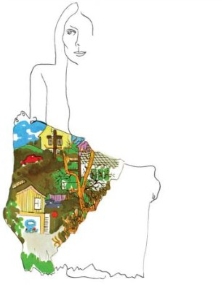Joni Mitchell’s song never stopped feeling urgent because we never stopped paving
By Clayton “Tiger” Hulin
Some songs don’t just stick around. They mutate, reincarnate, and pop their heads out of every decade like wildflowers pushing through cracked concrete. Joni Mitchell’s Big Yellow Taxi is one of those. Written in 1970 after she landed in Hawaii and looked out at paradise fenced in by asphalt, the tune was deceptively light. A sing-song guitar line, a bouncing rhythm, and then those words that cut deeper than most protest anthems ever dared: They paved paradise to put up a parking lot.
It wasn’t rage. It wasn’t a manifesto. It was Joni smiling sadly while telling the world what it was throwing away. And that smile was infectious enough to get the song passed around like a joint at a backyard fire.
First came Joni’s own recording, raw and clear. Then Sonny Bono sniffed out the spark and handed it to The Neighborhood, a group he produced in 1970. They gave it pop gloss, the kind of thing you might catch wedged between skits on The Sonny & Cher Comedy Hour. To this day, people swear Sonny and Cher sang it themselves. Memory is a funny editor. It cuts Sonny’s fingerprints into the wax even if Cher never laid down a take.

The 1990s brought Sheryl Crow, who turned it into a road-trip groove, a windows-down, radio-up warning disguised as a sunny jam. And by 2002, Counting Crows and Vanessa Carlton resurrected it for a new generation. Their version plastered itself onto soundtracks, commercials, and YouTube playlists, where it still racks up plays like it just dropped yesterday.
In 2019 the song returned once again. Allday and The Veronicas teamed up for triple j’s Like A Version and delivered a performance that stopped people in their tracks. The Veronicas stayed close to Joni’s original harmonies, their voices weaving like twin threads of grief and hope. Allday added a new verse about plastic islands, economic inequality, and the modern version of paradise sold for scrap. It was not nostalgia. It was proof the song still had teeth. Fans on the triple j textline wrote of goosebumps, tears, and the old ache of wanting to believe we could still turn things around.
The throughline is simple. The song never stopped feeling urgent because we never stopped paving.
Click over to YouTube and you will see it. Joni in her prime, the Counting Crows video with Carlton floating in on harmonies, Sheryl Crow in summer sheds, Allday and The Veronicas burning down a studio session with nothing but voices and a warning. Big Yellow Taxi is one of those tracks where every cover is less a replacement and more a mirror. Each one reflects what the world was afraid of losing in that moment.
More than fifty years later, paradise is still on the auction block. The song feels less like a time capsule and more like a warning we never bothered to heed. Mitchell wrote it in Hawaii, but you could write it looking out any window in America today.
The pavement keeps spreading. The voices keep singing. And somewhere on YouTube, paradise is still trying to get the last word in before the bulldozers win.
A Coda
Over time, some songs don’t just stick in your head. They haunt it. I am pretty sure I first heard Big Yellow Taxi when The Neighborhood sang it on The Sonny & Cher Comedy Hour. Maybe memory was playing tricks on me, the way it does when the mind is still young. But that is the thing about this song. It feels more alive, more re-imagined, than almost any other track I have ever listened to.
Every decade, someone picks it up, dusts it off, and sings it back at us. And every time, the chorus still sums up the world we are living in. A world where industry wins more often than nature, where paradise is always one bulldozer away from being a parking lot.





